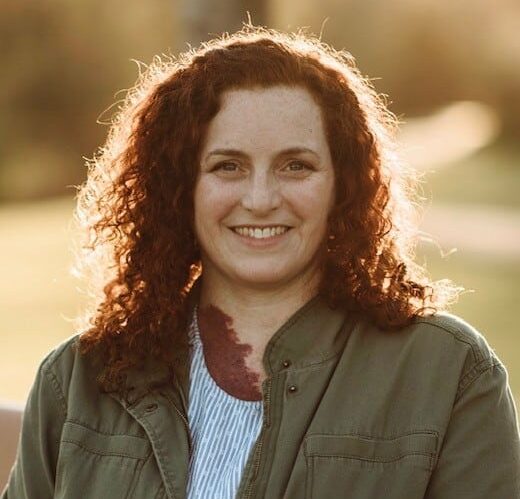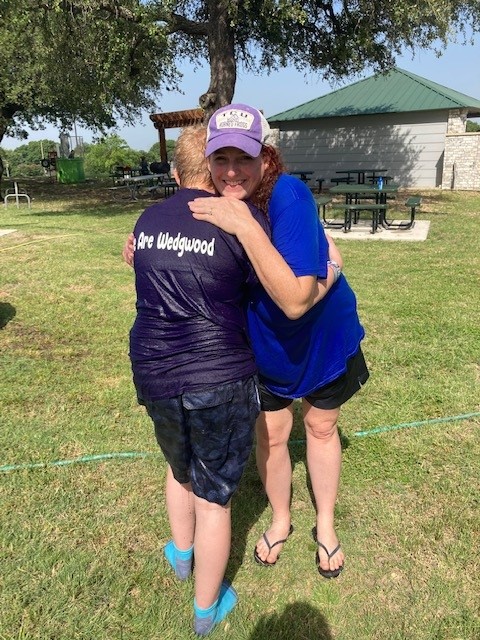Volunteer to Employee
Melissa Burdett called ACH when she was in the process of moving from Oregon to Texas to attend graduate school at TCU and begin the Karyn Purvis Institute. She then volunteered at our Robert and Jane Ferguson Residential Treatment Center for a year. Melissa is a TBRI® practitioner, which stands for Trust Based Relational Intervention. This trauma-informed response was created by the Karyn Purvis Institute and is practiced by the ACH staff.
ACH Volunteer Services Manager Megan Stephenson shares, “Melissa has been a joy with her knowledge of TBRI. She’s been so helpful to teach others because of her expertise.”
Melissa shares her experience as an ACH volunteer:

When I first called Megan to speak with her about volunteering at ACH, she told me about the teenagers at the Residential Treatment Center (RTC). I’m a foster/adoptive mom of five and teenagers are not new to me, yet I was intimidated by the idea of teens in a residential placement. What would they be like? Would I be able to connect with them? I’m used to little ones in care that can snuggle up next to me and read books or sing songs, little ones who look to me for connection, safety, and love. But teenagers in residential care?? That’s a whole different galaxy, isn’t it? I mean, what if they don’t like me? I’m embarrassed to admit it. A part of me still worries about being rejected and I wondered how the teens would respond to me.
Then I met them. They turned my world upside down in the best ways.
Each Tuesday night I hop in the van and drive to Fort Worth to hang out with some incredible people.
We’ve painted pictures, planted a garden, had Nerf wars, made paper airplanes, played basketball, drew a Monopoly board in chalk, conquered Wordle, chased each other around with foam burritos and laughed, talked, and laughed some more.
“I’ve seen the changes in them through their artwork, once so dark and tormented, now displaying hope, color, joy, and growth.”

These kids have been through so much. Trauma has hit them hard, but at the end of the day, they are still kids longing to know that they are worthy of love, that they are seen, heard, and valued. They are kids who want to know that they are not forgotten or discarded. They are precious regardless of their survival behaviors.
A trusting relationship with a safe adult can radically change the trajectory of a child’s life, altering brain chemistry and healing neuropathways. Many think it’s too late for teens to experience healing, but in fact, the brain is very open to change, growth, and repair in the teen years.
Over the course of nine months at ACH, I have seen incredible growth in some of the teenagers. Many have moved on to supported transitional housing. Some are nearing graduation out of the RTC and into a foster home or relative placement. I’ve seen the changes in them through their artwork, once so dark and tormented, now displaying hope, color, joy, and growth. There is an openness, dreams for the future, connection with friends and family–even connection with me.
A part of my heart is with these kids always. I can’t help but feel connected to them and their stories, invested in their growth and healing. In fact, I became so invested that now I find myself privileged to be on staff with ACH. I love getting to see kids in many of the ACH programs and watch their progress!
Serving at ACH has given me the opportunity to love kids who at face value may appear unlovable. Perhaps I have made their days a little brighter and showed them that they aren’t forgotten. Perhaps I have contributed a bit to their growth and transformation. But I can tell you for sure they have changed me. They have taught me that every person regardless of their background or behavior is worthy of love, care, and connection. Underneath that survival behavior lies a precious human. This is true of all of us – each and every one. I pray that I can live my life through a lens of compassion because I have seen firsthand that compassion brings connection and connection changes lives.

